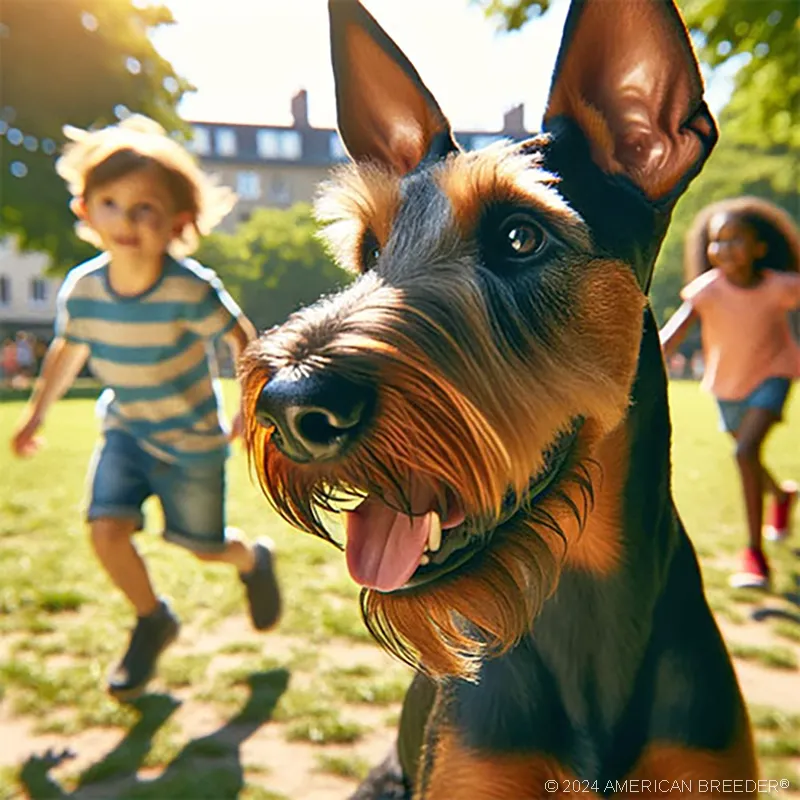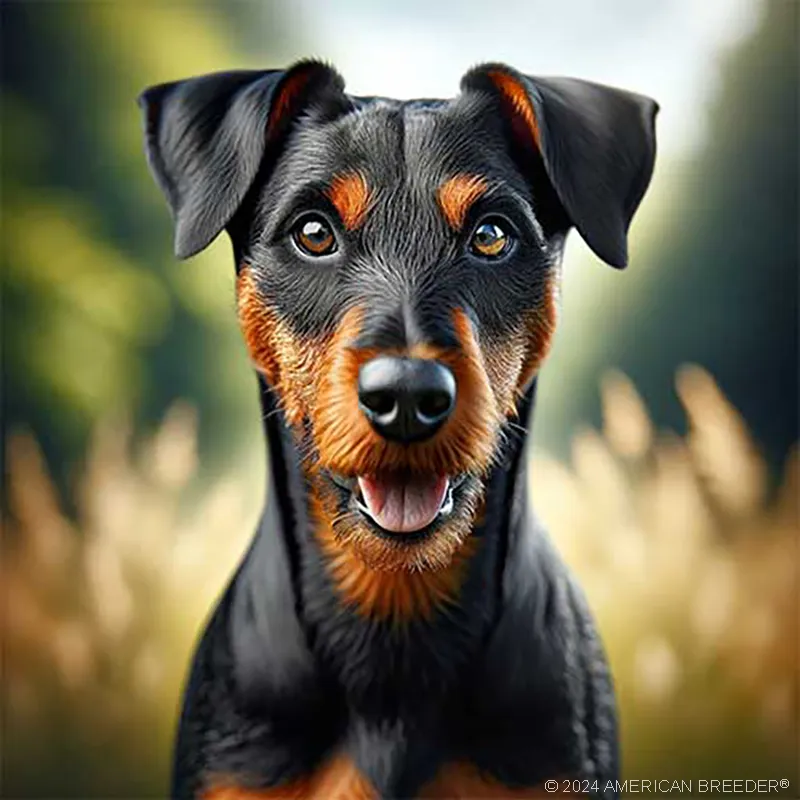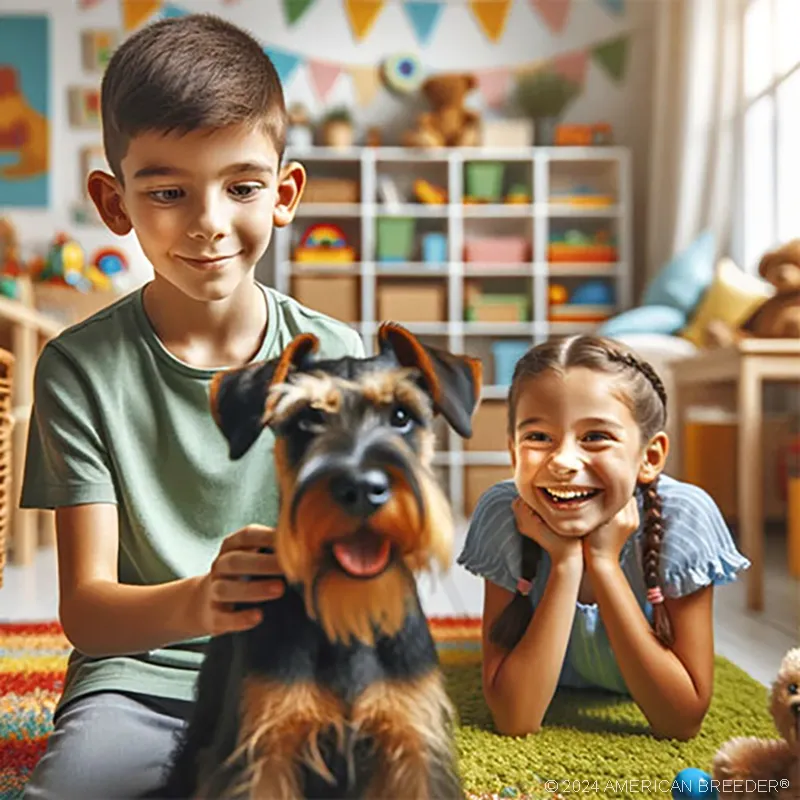Living Life with Deutscher Jagdterriers: Insights and Advice
Welcome to the world of Deutscher Jagdterrier dogs! This breed is known for its lively spirit and friendly nature, making it a popular choice for dog enthusiasts. Before diving into the details, it's important to consider a few things. Deutscher Jagdterriers require an active lifestyle and lots of mental stimulation, so be prepared for some fun adventures together. Interesting fact: This breed is also called the German Hunting Terrier or the German Jagdterrier, and its nicknames include "Jagd" or "Jagdterrier."
Breed Background and History
The Deutscher Jagdterrier traces its origins back to Germany, where it was developed in the early 20th century. This breed was bred specifically for hunting purposes and has a strong prey drive and excellent hunting instincts. It gained popularity for its ability to hunt various game, including foxes, boars, and badgers. While not recognized by the American Kennel Club (AKC), it is classified by the Fédération Cynologique Internationale (FCI) and other kennel clubs around the world.
Breed Characteristics
Deutscher Jagdterriers are small to medium-sized dogs, typically weighing between 17 and 22 pounds. They have a compact and muscular build, with a well-proportioned body. Their short and dense double coat comes in various colors, including black, tan, or a combination of both. Some Jagdterriers may also have white markings on their chest and paws, adding to their distinctive appearance.
When it comes to temperament, Deutscher Jagdterriers are known for their courageous and energetic nature. They are intelligent and alert, always ready for an adventure. These dogs are highly loyal and form strong bonds with their families, making them excellent companions. However, they can be independent and assertive, so early socialization and consistent training are essential.
Trainability and Intelligence
Deutscher Jagdterriers are intelligent and eager to please, which makes them relatively easy to train. They quickly pick up commands and thrive on positive reinforcement training methods. Due to their hunting background, they have a strong prey drive, so early and consistent training is important for proper control. These dogs excel in various dog sports and activities, including obedience, agility, and tracking.
Health and Care
Deutscher Jagdterriers are generally a healthy breed, but like any dog, they can be prone to certain health issues. Common concerns include hip dysplasia, patellar luxation, and eye problems. Regular veterinary check-ups and a balanced diet are crucial to maintaining their overall health. Their short coat requires minimal grooming, but occasional brushing and bathing will keep them looking their best. As active dogs, they require regular exercise to keep them mentally and physically stimulated.
 Socialization and Compatibility
Socialization and Compatibility
Deutscher Jagdterriers are generally good with children and can be playful and affectionate. However, due to their strong hunting instincts, caution should be exercised when introducing them to smaller pets. Early socialization is important to ensure they are well-adjusted and comfortable in various situations. Proper training and supervision can help them coexist peacefully with other animals.
Living Arrangements and Environment
Deutscher Jagdterriers are adaptable dogs and can thrive in various living arrangements. While they can live in apartments, they require regular exercise to burn off their energy. A house with a securely fenced yard is ideal for providing them with the space to run and play. They can also adapt to different climates, but extreme weather conditions should be taken into consideration.
Training and Obedience
Deutscher Jagdterriers thrive in an environment that provides them with mental and physical stimulation. Besides basic obedience training, they excel in more specialized activities such as scent work and tracking. These dogs have a natural instinct for hunting, so providing them with opportunities to exercise their skills in a controlled environment can be highly rewarding for both the dog and the owner. However, it is important to remember that their strong prey drive may require extra caution and control during off-leash activities.
Basic obedience training is crucial for Deutscher Jagdterriers to ensure they become well-behaved and obedient companions. These dogs are intelligent and eager to please, making them receptive to training. Start with fundamental commands such as sit, stay, come, and heel. Positive reinforcement methods, such as treats, praise, and play, work best with this breed. They respond well to consistent and gentle training techniques, as harsh or forceful methods can lead to resistance.
 Once the basics are mastered, consider more advanced training and specialized activities suited for the breed. Deutscher Jagdterriers excel in scent work, tracking, and agility due to their keen sense of smell, agility, and natural instincts. Engaging them in these activities not only provides mental and physical stimulation but also taps into their innate talents.
Once the basics are mastered, consider more advanced training and specialized activities suited for the breed. Deutscher Jagdterriers excel in scent work, tracking, and agility due to their keen sense of smell, agility, and natural instincts. Engaging them in these activities not only provides mental and physical stimulation but also taps into their innate talents.
It's important to note that Deutscher Jagdterriers have a strong prey drive. It's crucial to channel this instinct in a controlled and safe manner. Exposing them to scent work or tracking exercises can fulfill their natural hunting instincts and provide them with a sense of purpose. However, it's essential to ensure they have a solid recall and are under control in outdoor settings to prevent them from chasing after small animals.
Behavioral challenges can arise if Deutscher Jagdterriers are not adequately trained and stimulated. Their independent nature can lead to stubbornness or a tendency to test boundaries. Consistent training, positive reinforcement, and mental enrichment activities are key to keeping them engaged and well-behaved. Patience, consistency, and clear communication will go a long way in building a strong bond and a well-trained Jagdterrier.
Remember, training is a lifelong process, and it is important to continue reinforcing commands and providing mental stimulation throughout their lives. Regular training sessions and interactive playtime will help keep their minds sharp and maintain a strong bond between you and your Deutscher Jagdterrier.
As with any training, it's essential to approach it with patience, understanding, and positivity. By investing time and effort into training, you will be rewarded with a well-behaved and happy companion that you can enjoy a variety of activities and adventures with.
Financial Planning
Before bringing a Deutscher Jagdterrier into your home, it's essential to consider the financial responsibilities that come with pet ownership. Initial costs may include adoption fees or purchase price, vaccinations, spaying/neutering, and microchipping. Ongoing expenses will include high-quality dog food, regular veterinary care, grooming, training, toys, and other supplies. It is also advisable to budget for unexpected medical costs and consider pet insurance to help mitigate these expenses.
 Responsible Ownership and Ethical Considerations
Responsible Ownership and Ethical Considerations
When considering a Deutscher Jagdterrier, responsible ownership should be a top priority. Adopting from shelters or rescues is a wonderful option, as it gives a deserving dog a second chance at a loving home. If you decide to purchase from a breeder, make sure to research and choose a reputable one who prioritizes the health and well-being of their dogs. Avoid supporting puppy mills, which prioritize profit over the welfare of the animals. Responsible ownership also means providing proper training, socialization, and a safe environment for your dog to thrive.
Legal Responsibilities and Regulations
Owning a Deutscher Jagdterrier comes with legal responsibilities and regulations that vary depending on your location. Licensing requirements, leash laws, and vaccination mandates are just a few examples of the legal obligations that dog owners must adhere to. Understanding and following these regulations not only ensures the safety of your dog but also contributes to responsible dog ownership within your community.
Resources and Support
As you embark on your journey with a Deutscher Jagdterrier, it's important to have access to resources and support. Local veterinarians, trainers, and grooming services can provide professional guidance and assistance. Online communities, forums, and educational materials dedicated to the breed can offer valuable insights and advice. Additionally, books, websites, and reputable sources are excellent tools for further research on Deutscher Jagdterriers.
Conclusion
In conclusion, Deutscher Jagdterriers are charismatic and energetic dogs that bring joy and adventure to their families. Their hunting heritage makes them intelligent, active, and independent, requiring owners who are committed to providing them with the physical and mental stimulation they need. With proper training, socialization, and care, these dogs make loyal and loving companions. Remember, responsible ownership and continuous learning are key to ensuring a fulfilling and harmonious life with your Deutscher Jagdterrier.
Deutscher Jagdterrier Dog Quick Reference Guide
 Breed Background: Origin: Germany | Breed Purpose: Hunting Terrier | AKC Class: Foundation Stock Service | Year Recognized by AKC: Not recognized
Breed Background: Origin: Germany | Breed Purpose: Hunting Terrier | AKC Class: Foundation Stock Service | Year Recognized by AKC: Not recognized
Appearance: Size: Small to Medium | Weight: 17-22 lbs | Coat Type: Dense Double Coat | Colors & Patterns: Black & Tan | Distinctive Features: Compact Build, Erect Ears
Temperament: Energy Level: 4/5 | Loyalty: 5/5 | Friendliness to Pets: 3/5 | Friendliness to Strangers: 3/5 | Trainability: 3/5 | Playfulness: 4/5 | Frequent Barker: 4/5 | Chase Instincts: 5/5 | Sense of Smell: 5/5 | Drive to Hunt: 5/5
Health & Care: Health Issues: Prone to Ear Infections, Genetic Disorders | Lifespan: 10-12 years | Grooming Difficulty: Low | Exercise Needs: High
Socialization: Interaction with Children: Cautious but Tolerant | Interaction with Pets: Variable, Early Socialization Needed | Interaction with Strangers: Reserved | Elderly Compatibility: Affectionate | Ease of Training: Moderate
Suitable Living Arrangements: Apartment: No | House: Yes | Rural Area: Preferable | Yard Size Requirements: Medium to Large Yard
Training & Obedience: Trainability: 3/5 | Intelligence: 4/5 | Obedience: 3/5 | Problem-Solving: 4/5 | Easily Stimulated: 4/5 | Focus Level: 3/5 | Easily Distracted: 3/5
Financial Planning: Typical Price Range: $500 - $1000 | Initial Expenses: Vaccinations, Training | Ongoing Annual Expenses: Food, Veterinary Care
Breeding: Reproductive Maturity: 8-12 months | Litter Frequency: 1-2 litters per year | Litter Size: 4-8 puppies | Stud Cost: Varies | Breeding Challenges: Small litter size, Health Screening Needed
Did You Enjoy this Article? Share it and Help Us Spread the Word!
If you found this article helpful, we'd appreciate it if you could share it with your friends or link to it from your website, blog, or group! You can also use the convenient social share tabs on the left side of the screen to instantly share this page to your social media feed. For more ways to support and promote the American Breeder Community, visit our Share & Promote Together page for social media posts and memes you can copy and share. Your support means the world to us!
Disclaimer: The information provided in this article is for general informational purposes only and does not constitute legal, medical, financial, or professional advice. While we strive for accuracy, we make no representations or warranties regarding the completeness, accuracy, reliability, or suitability of the information. Please consult with a professional before making decisions based on the content provided. American Breeder Inc. assumes no responsibility for any errors or omissions or for the results obtained from the use of this information.

